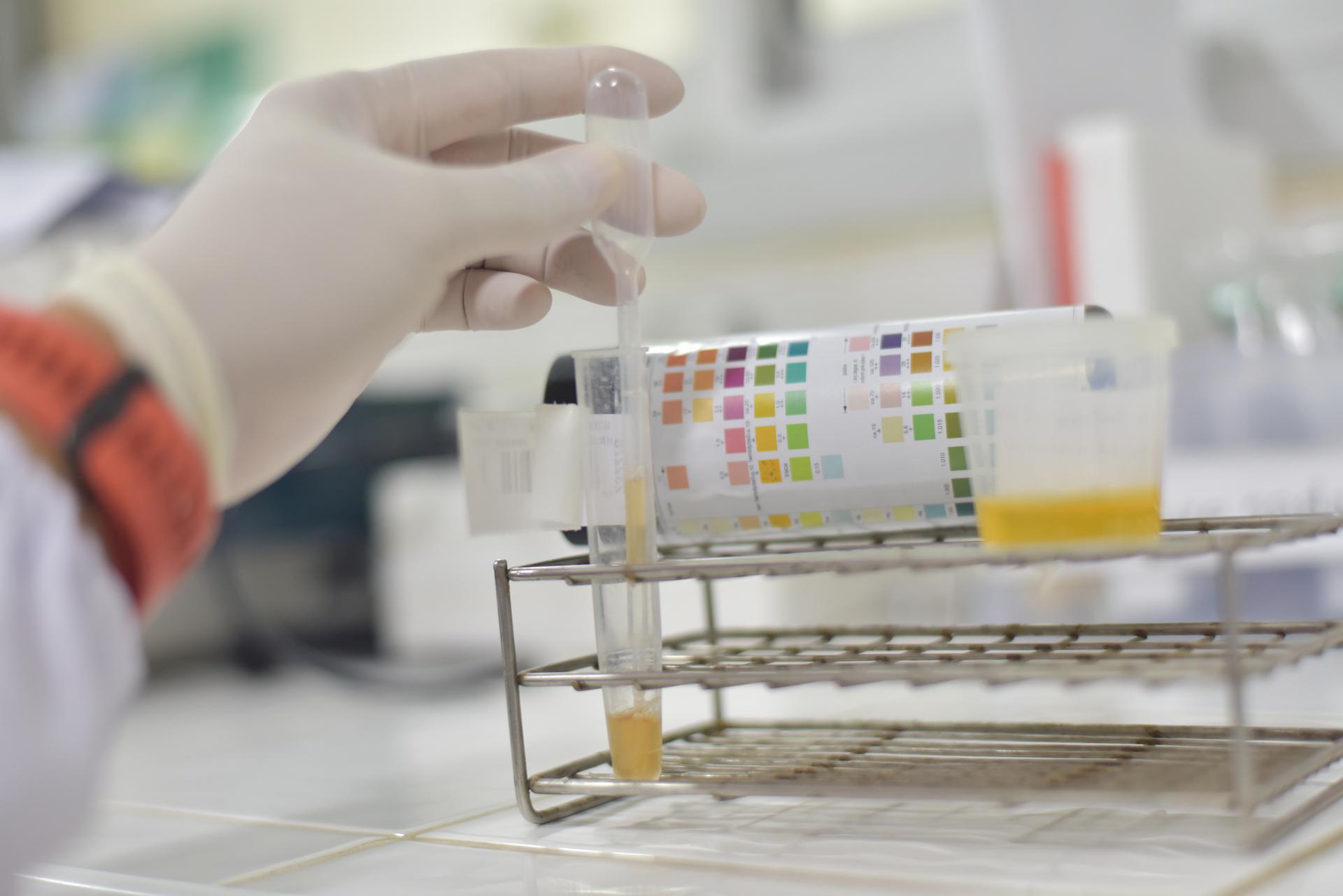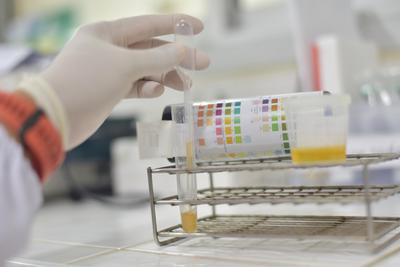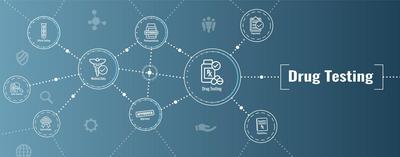What Does a Standard Drug Test Screen for?
A standard drug test is one that detects certain common substances. Drug tests are referred to by the number of drugs they test for. At Health Street, drug tests range from 5 panel (five different drugs) to a comprehensive 25 panel drug test. The most common panels are 5, 10 and 12. Department of Transportation regulated businesses can only use a DOT-approved urine drug test, while other companies have more options. The most frequently used method for detection is through urinalysis.
In this article, we'll examine what a typical drug test screens for, why it is important to test for these substances, and when these types of tests may be administered.
Health Street offers a wide range of both standard and customizable drug tests for employers, court systems and individuals. Learn more about Health Street's comprehensive drug testing services.
Listen to article

What is a Standard Drug Test and Who Uses Them?
While drug tests can be customized to satisfy the specific needs of an individual, employer or court case, standard drug tests are those that test for certain commonly abused substances. The five items in a 5-panel drug test are Marijuana, Cocaine, PCP, Basic Opiates (Morphine, Codeine and Heroin) and Amphetamines. From there, you can add Barbiturates, Benzodiazepines (tranquilizers), Methadone, Propoxyphene (opioid pain reliever), Methaqualone (Quaaludes), Ecstasy, Hydrocodone and Oxycodone, Demerol and Tramadol, depending on specific workplace concerns.
Many companies use a pre-employment drug test as part of their screening process for a job candidate, and then random or periodic testing for employees. This helps keep their workplaces safe and reduces liability risk due to accidents caused by those who are using drugs.
For employers that are federally regulated, such as the Department of Transportation, urine drug testing is required before someone can be hired for a sensitive position. Regulations require specially-approved drug tests which cover all transportation employees such as airline pilots, bus drivers, truck drivers, taxi drivers and railroad workers.
Other industries that typically require drug tests include hospitals and health services, elder care facilities and childcare providers. College and professional athletic departments require that their athletes undergo regular testing. Courts order drug tests to satisfy legal requirements, and individuals may want to request a drug screening for themselves or for family members.
Why is Drug Testing Especially Important Right Now?
We are living in unprecedented times with the coronavirus pandemic. According to the Centers for Disease Control and Prevention (CDC), the pandemic appears to be causing a rise in drug overdose deaths, due to COVID-19 shutdowns and disruptions to daily life. These increases have been fueled by synthetic opioids, especially illegally manufactured fentanyl. Ten western states have seen drug-related deaths increase by more than 98 percent due to synthetic opioids. Cocaine overdoses also increased by 26.5 percent and are believed to be linked to simultaneous use with fentanyl or heroin or contamination with these substances.
The American Medical Association (AMA) confirms the CDC's findings and adds illicitly manufactured methamphetamine to the substances that are leading to higher numbers of drug fatalities during the coronavirus pandemic. More than 40 states believe that the situation may get worse.
Current conditions, including those with drug abuse issues being isolated and not being able to get proper treatment, and workers returning to facilities after working remotely, dictate the need for workplace safety measures and rigorous drug testing.
When Are Drug Tests Administered in the Workplace?
In addition to organizations where employee screening is mandatory, many other industries require pre-employment testing as part of a comprehensive drug testing program to ensure workplace safety, enhance productivity, reduce accidents and protect the company from liability. For existing employees, there may be periodic or random testing that makes up part of the company's drug-free workplace program. Screening services may be ordered after work-related accidents, following drug treatment, or if there is reasonable suspicion that an employee is using drugs that can pose a danger in the work environment.
What is Tested in a Typical Drug Screen?
The most widely used method for detecting drugs is urinalysis, which is using a sample of the person's urine. Hair testing and oral fluid (saliva) tests are also available, but urine testing has been the standard for many years. It is inexpensive and effective. Urine tests can detect many drugs.
What Does a Standard Drug Test Check For?
The most basic (and common) drug test screens for marijuana, cocaine, PCP, basic opiates (heroin, morphine, codeine) and amphetamines. This is a 5 panel drug test. Other standard panels add on popular and frequently abused substances like Ecstasy, Hydrocodone, Oxycodone, Benzodiazepines (Valium, Xanax) and barbiturates.
Drugs Tested in Panel Drug Tests
The substances you'll want to test your employees for may vary by industry, organization and location. As of the 2020 election, 15 states approved legal marijuana for recreational use. Medical marijuana is legal in 33 states plus the District of Columbia. Because of this, employers may choose not to test for it.
Following are details about the most popular standard panel drug tests offered by Health Street.
This basic drug test originated in the 1980s, when mandatory workplace drug testing was first introduced into U.S. businesses. Drug usage has of course changed over the years. For some individuals or companies, this basic test will be sufficient, but others may wish to include modern drugs of abuse. You can choose to exclude THC (marijuana) and add in today's popular drugs like ecstasy, oxycodone or hydrocodone. You can also add in alcohol and/or nicotine, depending on your requirements.
All Health Street panel drug tests use a SAMHSA certified laboratory for analysis, with results reviewed by one of their resident licensed physicians.
Health Street's Comprehensive, Safe and Secure Drug Testing
Health Street provides professional, safe and secure drug and alcohol testing at more than ten thousand clinics nationwide and in parts of Canada. Both DOT and non-DOT tests are available. In addition to offering a wide range of testing services, including urine testing, hair tests and alcohol testing, we also manage random drug testing programs for individuals and organizations.
The StaffGlass Solution for Drug Testing Management
Business users of Health Street's drug and alcohol testing services get access to StaffGlass™, a comprehensive portal for ordering, checking the status of, managing and reviewing the results of your tests. You can also do remote ID verification, set up and view pre-employment background checks, register your employees for occupational health services, manage e-sign documents and update employment status. In addition, StaffGlass users can manage their random pools for drug tests, adding or removing staff members.
The Many Benefits of Health Street Alcohol and Drug Testing
Health Street drug testing benefits include:
Discover the premiere drug screening services and drug testing resources available at Health Street.




